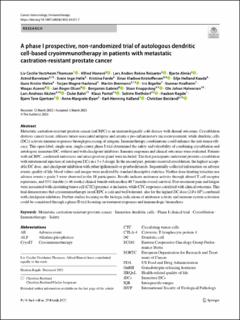A phase I prospective, non-randomized trial of autologous dendritic cell-based cryoimmunotherapy in patients with metastatic castration-resistant prostate cancer
Thomsen, Liv Cecilie Vestrheim; Honore, Alfred; Reisæter, Lars Anders Rokne; Almås, Bjarte; Børretzen, Astrid; Helle, Svein Inge; Førde, Kristina; Kristoffersen, Einar Klæboe; Kaada, Silje Katrine Helland; Melve, Guro Kristin; Haslerud, Torjan Magne; Biermann, Martin; Bigalke, Iris; Kvalheim, Gunnar; Azeem, Waqas; Olsen, Jan Roger; Gabriel, Benjamin; Knappskog, Stian; Halvorsen, Ole Johan; Akslen, Lars Andreas; Bahn, Duke; Pantel, Klaus; Riethdorf, Sabine; Ragde, Haakon; Gjertsen, Bjørn Tore; Øyan, Anne Margrete; Kalland, Karl Henning; Beisland, Christian
Journal article, Peer reviewed
Published version

View/
Date
2023Metadata
Show full item recordCollections
- Department of Clinical Science [2318]
- Registrations from Cristin [9791]
Abstract
Metastatic castration-resistant prostate cancer (mCRPC) is an immunologically cold disease with dismal outcomes. Cryoablation destroys cancer tissue, releases tumor-associated antigens and creates a pro-inflammatory microenvironment, while dendritic cells (DCs) activate immune responses through processing of antigens. Immunotherapy combinations could enhance the anti-tumor efficacy. This open-label, single-arm, single-center phase I trial determined the safety and tolerability of combining cryoablation and autologous immature DC, without and with checkpoint inhibitors. Immune responses and clinical outcomes were evaluated. Patients with mCRPC, confirmed metastases and intact prostate gland were included. The first participants underwent prostate cryoablation with intratumoral injection of autologous DCs in a 3 + 3 design. In the second part, patients received cryoablation, the highest acceptable DC dose, and checkpoint inhibition with either ipilimumab or pembrolizumab. Sequentially collected information on adverse events, quality of life, blood values and images were analyzed by standard descriptive statistics. Neither dose-limiting toxicities nor adverse events > grade 3 were observed in the 18 participants. Results indicate antitumor activity through altered T cell receptor repertoires, and 33% durable (> 46 weeks) clinical benefit with median 40.7 months overall survival. Post-treatment pain and fatigue were associated with circulating tumor cell (CTC) presence at inclusion, while CTC responses correlated with clinical outcomes. This trial demonstrates that cryoimmunotherapy in mCRPC is safe and well tolerated, also for the highest DC dose (2.0 × 108) combined with checkpoint inhibitors. Further studies focusing on the biologic indications of antitumor activity and immune system activation could be considered through a phase II trial focusing on treatment responses and immunologic biomarkers.
